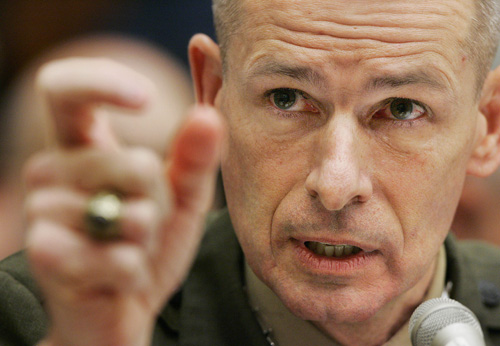Top general regrets anti-homosexuality remarks

Chairman of the Joint Chiefs of Staff Gen. Peter Pace testifies before the House Armed Services Committee on the Department of Defense Fiscal Year 2007 budget on Capitol Hill in Washington in this Feb. 8, 2006 file photo. The Associated Press
March 14, 2007
WASHINGTON – The Pentagon’s top general expressed regret Tuesday for voicing his personal view that homosexuality is immoral, but he did not apologize for the comment that drew criticism from lawmakers and gay-rights groups.
In a newspaper interview Monday, Marine Gen. Peter Pace, chairman of the Joint Chiefs of Staff, likened homosexual acts to adultery and said the military should not condone it by allowing gays to serve openly in the armed forces.
After a flurry of condemnation Tuesday, Pace issued a statement acknowledging that the Defense Department “don’t ask, don’t tell” policy on gays is a sensitive subject and said: “I should have focused more on my support of the policy and less on my personal moral views.”
The military lets gay men and lesbians serve if they keep their sexual orientation private. Commanders may not ask, and service members may not tell. More than 10,000 troops, including more than 50 specialists in Arabic, have been discharged since President Clinton signed it into law in 1994.
In an interview with the Pentagon Channel, Defense Secretary Robert Gates declined to answer a question on his opinion of the policy but made what seemed to be a mild rebuke of Pace.
Get The Daily Illini in your inbox!
“Now look, you know I think personal opinion really doesn’t have a place here,” Gates said. “What’s important is that we have a law, a statute that governs ‘don’t ask, don’t tell.'”
He added: “That’s the policy of this department, and it’s my responsibility to execute that policy as effectively as we can. As long as the law is what it is, that’s what we’ll do.”
In an interview Monday with the Chicago Tribune, Pace was asked about the policy. He said he supports it, that it allows gays to serve and that it does not make “a judgment about individual acts.”
He also said: “I believe that homosexual acts between individuals are immoral and that we should not condone immoral acts. I do not believe that the armed forces of the United States are well served by saying through our policies that it’s OK to be immoral in any way.”
Lawmakers of both parties criticized Pace’s remarks.
“We need the most talented people; we need the language skills. We need patriotic Americans who exist across the board in our population,” said House Speaker Nancy Pelosi, D-Calif. “We don’t need moral judgment from the chairman of the Joint Chiefs.”
Sen. John Warner, R-Va., one of Congress’ most respected authorities on military matters and a former Navy secretary, said, “I respectfully but strongly disagree with the chairman’s view that homosexuality is immoral.”
Also chastising Pace was Rep. Martin Meehan, D-Mass., who has introduced legislation repealing the policy.
“Our military is struggling to find and keep the soldiers we need,” Meehan said of the strain caused by fighting two wars. “We are turning away good troops to enforce a costly policy of discrimination.”
In a sign of how politically sensitive the issue remains, Democratic leaders have yet to schedule debate on Meehan’s bill.
White House spokesman Tony Snow said President Bush “has always said that the most important thing is that we ought not to prejudge one another. But when it comes to government policy, it’s been in place for a long time and we will continue to execute it according to the letter of the law.”
Presidential contender Sen. John McCain, R-Ariz., who spoke to reporters outside a fundraiser in Beverly Hills, Calif., said Pace “should be given a chance to explain himself.” Asked for his own view on homosexuality in the military, McCain said he believes the “don’t ask, don’t tell” policy is “successful and should be maintained.”
Pace, a native of Brooklyn, N.Y., and a 1967 graduate of the U.S. Naval Academy, said in the interview that he based his views on his upbringing.
“As an individual, I would not want (acceptance of gay behavior) to be our policy, just like I would not want it to be our policy that if we were to find out that so-and-so was sleeping with somebody else’s wife, that we would just look the other way, which we do not. We prosecute that kind of immoral behavior,” he said, according to the audio and a transcript released by his staff.
Two gay advocacy groups strongly condemned Pace’s remarks.
“General Pace’s comments are outrageous, insensitive and disrespectful to the 65,000 lesbian and gay troops now serving in our armed forces,” said the Servicemembers Legal Defense Network, which has represented some of the thousands dismissed from the military for their sexual orientation.”






